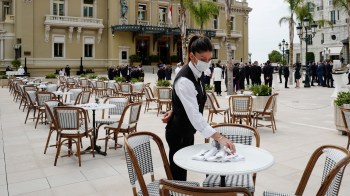French cuisine’s not what it used to be
TEXT OF INTERVIEW
KAI RYSSDAL: Today is Bastille Day, the 14th of July, a major French holiday. If you’re of a mind to — and if you know a good French restaurant nearby — perhaps you’ll celebrate with some steak frites and a nice bottle of Chateauneuf du Pape.
Revelers in France, however, might want to think twice before they eat out.
Author Michael Steinberg’s worried you’ll be disappointed. From bread and cheese to bouillabaisse, he says French cuisine isn’t quite what it used to be. And he says it in his new book “Au Revoir to All That.”
Welcome to the program.
MICHAEL STEINBERGER: Thank you for having me on.
RYSSDAL: How do you know, Michael, that French cuisine is not as good as it used to be?
STEINBERGER: You can see it in all sorts of ways. You see thousands of cafes, bistros and brasseries disappearing every year. France is losing 30,000 farms a year. Wine, another iconic part of French cuisine . . . wine consumption in France has declined more than 50 percent over the last 40 years and continues to plummet.
RYSSDAL: What the heck happened, then. I mean, if a whole country’s cuisine is less good than it used to be, what’s going on?
STEINBERGER: Well, a couple things. Complacency for one. They’ve been the kinds of cuisine for hundreds of years and it’s natural to get a little complacent when you’ve been the unsurpassed kings for so long. But the biggest factor is economic. You’ve had basically 30 years of economic stagnation in France, and French cuisine has stagnated as a result. It’s not an ideological or political argument. You’ve had governments of both the left and right, and all have served up the same toxic stew: anemic growth, high unemployment, stagnant wages and living standards, and crippling levels of taxation and regulation. And that has really hurt the culinary arts in France.
RYSSDAL: Is that a long way of saying cheap. Consumers in France, and hence maybe the rest of the world, are looking for a cheaper, faster, easier meal than the time it takes to really do it right?
STEINBERGER: Well, that’s certainly become an imperative for many people in France. With living standards for many being so stagnant, people have had to economize on what they eat and drink. They’ve gravitated to hypermarkets, the big supermarkets that are much more cost-effective…. They offer much cheaper food, by and large, than those glorious outdoor markets that we associate with France. And in terms of eating out, they’ve gravitated in many cases to fast food, not least, McDonald’s. France is now the second-most profitable market in the world for McDonald’s.
RYSSDAL: Is there an element here of the rise of the rest — that other countries and other nationalities are getting better at food and taking more care and then the French sort of suffer by comparison?
STEINBERGER: That’s a big part of it. We eat much better here in the U.S. than we did 20 or 30 years ago. It’s true in Britain. It’s true in many places. And so France has lost that exceptionalism, I guess you could say. It’s no longer the place one has to go to eat well. In fact, in the last 10, 15 years, as far as haute cuisine goes, as far as cuisine at the highest levels goes, it’s Spain that has really become the culinary lodestar.
RYSSDAL: That must just kill the French, that the Spanish are good at food now. I bet the only thing worse would be, like, if the Brits were better at food.
STEINBERGER: I think it does grate at them quite a bit. I’m not sure . . . You know, you’ve got the Spanish now getting all the attention. You’ve had great food happening in Britain. In fact, talk about insulting the French, Gourmet magazine a few years ago named London the most exciting food city in the world. So, yeah, I think all these things are very damaging to the French psyche, perhaps. And the idea of an American writing about the decline of French cuisine . . . probably more salt in the wound.
RYSSDAL: That’s right. What about the future, though, Michael? I mean, economics aside, are you hopeful about French cuisine?
STEINBERGER: I am cautiously optimistic that there’ll be a recovery here. You see, for instance, a very promising movement in Paris — it’s even got a name now, called bistronomy . . . Young, extremely talented chefs who 20-30 years ago would have been considered shoo-ins for three Michelin stars, would have risen to the pinnacle of the profession, they’ve decided to do something very different. Instead of opening luxury palaces, they’ve opened casual bistros, oftentimes in less-posh parts of Paris, serving glorious food but in a much more casual setting and at a price many more people can afford. And that’s a really encouraging sign.
RYSSDAL: Michael Steinberger is a wine columnist for Slate. His book on the decline and fall of French cuisine is called “Au Revoir to All That.” Michael, thanks a bunch.
STEINBERGER: Thank you.
There’s a lot happening in the world. Through it all, Marketplace is here for you.
You rely on Marketplace to break down the world’s events and tell you how it affects you in a fact-based, approachable way. We rely on your financial support to keep making that possible.
Your donation today powers the independent journalism that you rely on. For just $5/month, you can help sustain Marketplace so we can keep reporting on the things that matter to you.


















